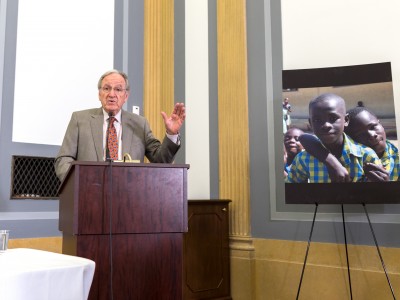It isn’t every day that a child slavery survivor from Africa is a featured speaker at a congressional briefing. But this week, Capitol Hill witnessed the award-winning advocate and child trafficking survivor, James Kofi Annan, speaking alongside long time anti-slavery champion Senator Tom Harkin, to address the global injustice of child labor.
The Alliance to End Slavery & Trafficking (ATEST) and the Child Labor Coalition hosted the panel to discuss how to reduce exploitative child labor, reflect on the progress that grassroots and governmental efforts have made, and promote the international benefits of ending child trafficking.
James Kofi Annan, founder of FTS frontline partner Challenging Heights, opened the discussion by acknowledging that although the U.S. has passed measures to combat exploitative child labor, there is still much work to be done. “We have made lots of progress, but we could do so much more,” James said. He remarked that vulnerable countries like Ghana need the U.S. to pressure their governments by shaming their lax enforcement of anti-slavery laws.
Sen. Harkin said was is honored to be in the same room as James. “I just wish I could duplicate James so we could have a leader like him in every country to end child labor,” said Harkin.

Sen. Tom Harkin at briefing | Photo: Cavin Elizabeth Photography
The senator focused his remarks on child trafficking issues found in Ghana and the Ivory Coast. He announced that by 2020, he has set a goal to decrease child slavery in these areas by 70 percent. He has led congressional efforts to pass legislation that would prohibit child labor and the production of goods that promote child trafficking. Although he is retiring, he stated, “I may be retiring from the Senate, but I am not retiring on this issue.”
Also featured on the panel were policy advocates from Solidarity Center, GoodWeave and the U.S. Department of Labor. They highlighted the economic and security gains that could occur when child slavery is abolished.
Solidarity Center Director Shawna Bader-Blau stated that “collective bargaining is a requirement for any long term plan to be successful in creating fair and sustainable labor solutions,” and that it is the “creation of jobs in our partnering countries that drives down poverty, which is the root of many exploitation cases.”
Claude Fontheim of GoodWeave noted that a “long term issue such as child exploitation needs a long term investment.” The Labor Department’s Carol Pier explained that for the government to have the greatest impact, it needs to be “intimately aware of the problems and shortcoming in countries’ labor laws.”
The briefing concluded with encouragement to pass federal legislation to build transparency in business supply chains, encourage corporate accountability, and promote good governance in democracies around the world.



